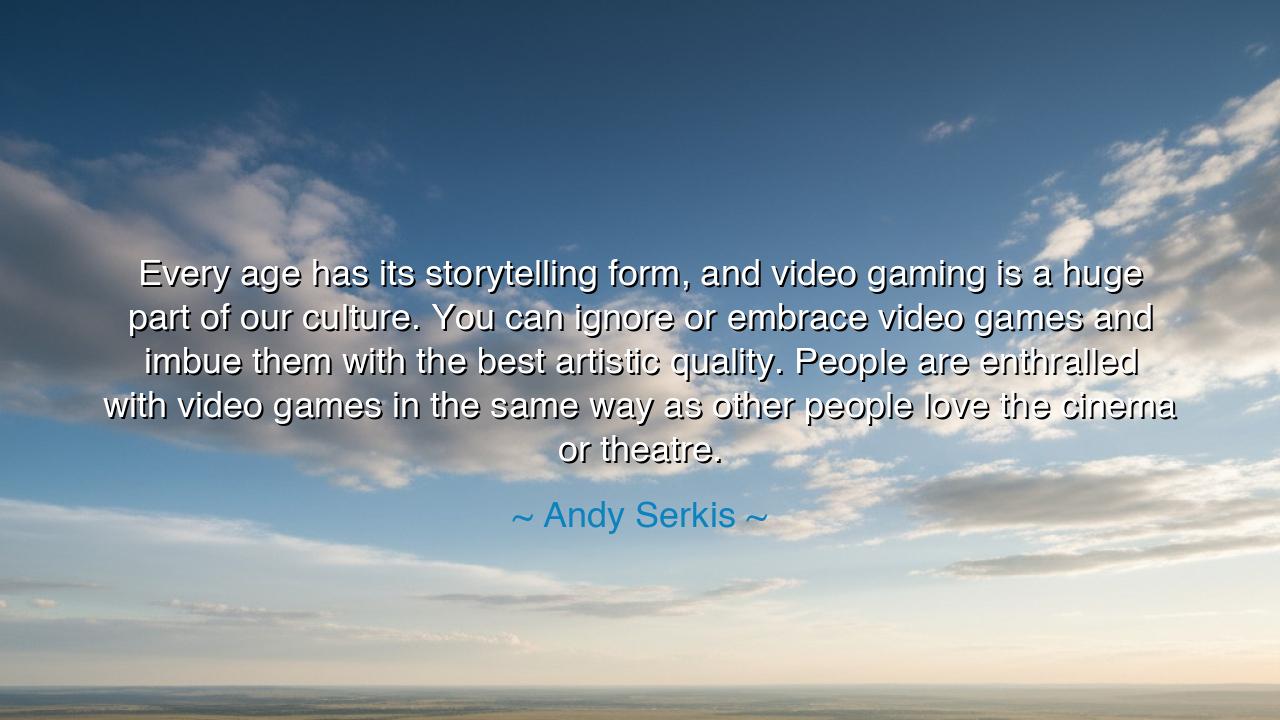
Every age has its storytelling form, and video gaming is a huge
Every age has its storytelling form, and video gaming is a huge part of our culture. You can ignore or embrace video games and imbue them with the best artistic quality. People are enthralled with video games in the same way as other people love the cinema or theatre.






In every era, the human spirit finds a way to tell its stories. The ancient world spoke in the rhythm of epic poems, the clashing of swords, and the voices of bards who sang of heroes and gods. The Renaissance gave birth to the theatre, where men and women, clothed in the trappings of their roles, shared the tale of humanity's joys and tragedies before captivated audiences. The world has always craved stories, for in them we find our identity, our purpose, and our collective wisdom. And now, in the modern age, another form has risen—one that has captured the hearts and minds of millions: the art of video gaming. As Andy Serkis wisely states, "Every age has its storytelling form, and video gaming is a huge part of our culture."
Video games, though often seen as a new or novel medium, are no less significant than the oral traditions of old or the theatre of the great playwrights. The canvas of the video game is vast, painted with the brushstrokes of interactivity and immersion. Through this medium, we do not merely observe—we become part of the story, stepping into the roles of the heroes and villains. We traverse strange worlds, make choices that define destinies, and engage in challenges that shape our very being. Just as the ancient epics invited listeners to live through the valor of their characters, so too do video games invite us to partake in their tales, to feel their victories and their defeats.
Consider the great Greek epics—Homer’s Iliad and Odyssey—works that have passed through generations, carried by the voices of storytellers, shaping the way we view the world. These stories of heroism and sacrifice are not merely relics of an ancient past but a testament to the human need to tell stories. The theatre of Shakespeare, which transformed the stage into a battlefield of emotions, of love, of tragedy—this, too, shaped the course of culture, challenging both the actor and the audience to live through the spectacle of the human condition. Video games, much like these forms, provide a platform for the same experiences, yet their immersive nature creates a new bond—a direct connection between the storyteller and the participant. We do not sit passively in the theatre, we engage, we act, we decide the fate of worlds.
Andy Serkis, a master of both acting and performance capture, recognizes that video games, like the cinema or the stage, possess the ability to move us. His statement is not merely an acknowledgment of a passing trend, but a call to honor this new form of storytelling. We can either choose to ignore it, dismissing it as mere entertainment, or we can embrace it, allowing it to reach its full potential as an art form. Just as we celebrate the written word or the painted canvas, we must also celebrate the interactive worlds where the player holds the power to shape the story.
Let us consider a story that transcends the boundaries of traditional storytelling—the tale of The Last of Us, a video game that has been hailed not only for its gameplay but for its emotional depth. The characters, their struggles, their relationships, and the moral dilemmas they face, resonate with the same power as the finest tragedies of theatre. The emotions stirred within us by the choices we make, the sorrow of loss, the joy of connection, mirror the struggles of the greatest heroes in ancient tales. This, indeed, is art—art that evolves with the time, art that immerses the participant in a world where their actions matter.
What, then, is the lesson we must learn from these words? The art of storytelling is a living, breathing thing—it evolves as society evolves. Just as we would not discard the teachings of Shakespeare or the great Greek playwrights, neither should we discard the artistry of the video game. Stories, after all, are the soul’s mirror, reflecting our hopes, fears, and dreams. The rise of video games as a central form of expression is not to be feared but embraced. It is an invitation to step into a world where we do not merely observe, but actively create. The art of the game is a new frontier, one that promises to continue the ancient tradition of storytelling in ways that were once unimaginable.
Therefore, as we move forward into a new era, let us carry with us this timeless truth: the forms of storytelling may change, but the human need to connect, to create, and to understand through shared experiences remains eternal. Let us embrace this new form, and, in doing so, honor the great storytellers of our time, who, with their interactive mediums, continue to shape our culture, our emotions, and our lives. The future of storytelling is not separate from its past—it is woven into the very fabric of what it means to be human.






AAdministratorAdministrator
Welcome, honored guests. Please leave a comment, we will respond soon